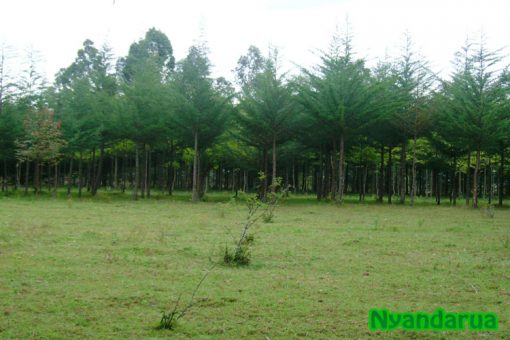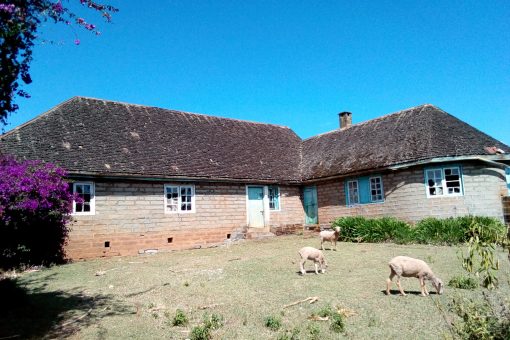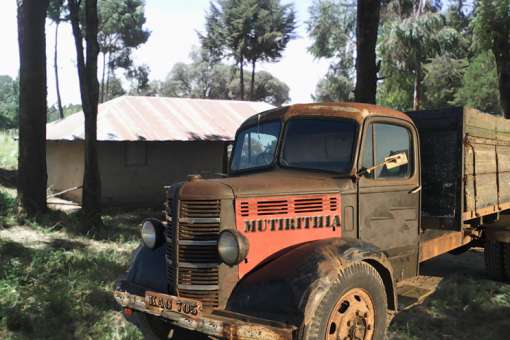My sisters’ baby was so cute, he looked like a doll. There was a table in my sisters’ bedroom full of baby products from Johnson & Johnson. Baby Lotion, Baby Oil, Baby Shampoo, Baby Powder, I had never seen so many bottles meant for one little baby. But the products made the baby smell so good you wanted to hold him all the time.
This is in total contrast with babies I held in OlKalou. No disrespect here, but I associated babies with funky smells. A combination of pee, burp and breast milk that had dried out on their clothes, they exuded a sour smell. That was when you caught them on a good hour before they started smelling of poop. OlKalou babies also had a uniform unisex outfit which I had come to believe was the only outfit made for babies. It was made from a soft cotton flannel fabric “Nguo ya mbamba” translation cotton fabric. The base colors were blue, green, pink or yellow with animal pictures printed in black and red. Every baby you saw had Nguo ya mbamba on. I guess it was ideal for keeping babies warm in the cool OlKalou weather.
Every baby I saw in OlKalou was also swaddled in a towel. A bath towel. The towel was used for swaddling the babies when they were infants and it was later used for draping the babies when they were strapped on their mothers backs. The towel was for keeping the baby warm and it also acted as a decorative shawl especially when traveling outside the home. The babies also slept with their mothers until they were toddlers, old enough to join their older siblings in their beds.
Imagine my shock when I entered my sisters’ bedroom and I saw the baby sleeping in his baby cot. That is how I knew what the cot was for, otherwise I would have thought it was a chicken coop (Kiaga kia nguku). I had never seen a baby cot before and since it had high bars all around, chicken coop was the only familiar thing that could have come to my mind. I dodged that bullet, I did not have to ask what the cot was used for. I also saw a mosquito net hanging from the ceiling directly over the baby cot. That, I had to ask what it was. Then there were the drawers full of baby clothes and diapers, all looking so clean and new. I realized this baby did not have a single Nguo ya Mbamba like those OlKalou babies. You mean there are so many other fabrics used for baby clothes?
I saw them all at my sisters’ and you can imagine my shock. Then came the swaddling. I was expecting to hold the baby swaddled in a towel. Not this baby. The towels were used for his bath only, they were never taken outside the bedroom, unless for washing. The baby was swaddled in three layers. First, a soft cotton sheet, second, a soft baby blanket and finally a shawl for the outside layer. That baby looked like an Angel in his beautiful everything.
The baby’s feeding bottles and other baby accessories were also unique. They were made specially for babies and my sister made sure everything for baby was handled separately, including the sufuria that sanitized baby’s utencils. Contrast that to what I knew in OlKalou. There were no baby bottles or baby products sold separately. A family with a new baby saved whatever glass bottles they found and used them for bottle feeding. The only thing they bought was the teat (Munyonyi) which was affixed on the mouth of the bottle and that turned the ordinary bottle into a baby bottle. The bottle was filled with any liquid the mother laid her hands on to feed their baby. Milk, Tea, Uji, Juice, you name it, our babies sucked it up and they were happy and healthy. The empty bottle was then put together with other dirty dishes and they were all washed together. That was what I knew about babies and their care, and that is why my sister’s style was amazing me at every step.
How did I know so much about babies in OlKalou? Majority of women in OlKalou were in their child bearing years. Often times we met friends of our mother in town, and they sent us with a message “mwire mami wanyu agooka kunyua chai” translation, tell your mother to come have tea at our home. At first that was really confusing because our mother had all the tea she needed at home. It dawned on me later when we went shopping for “Nguo ya mbamba”, a kilo of sugar, a tin of Cadbury Cocoa (ya gucokia thakame) and two loaves of bread and went visiting the home of her friend who just had a baby.
Bingo! I had cracked that code. Chai meant a new baby. Got it.



